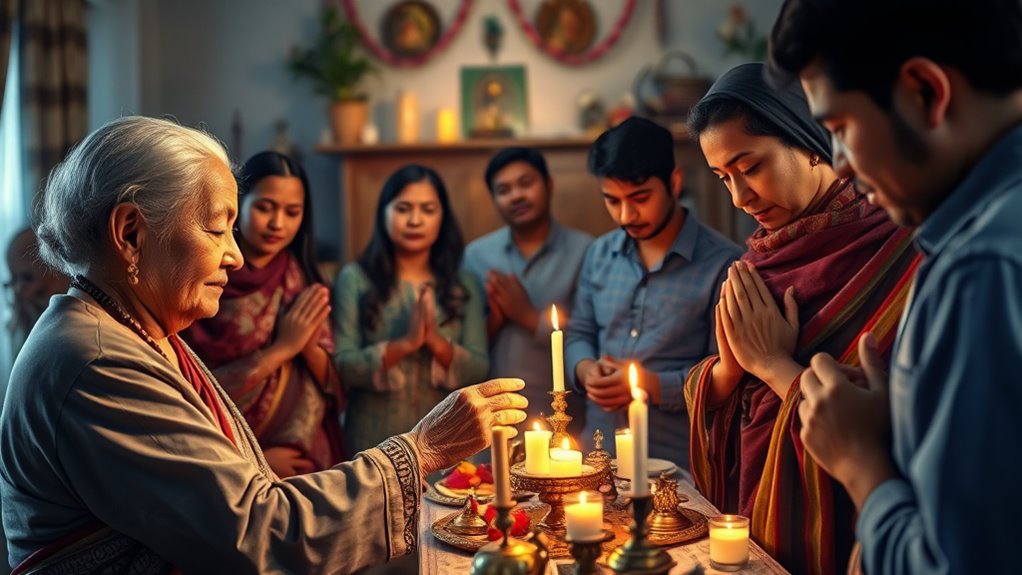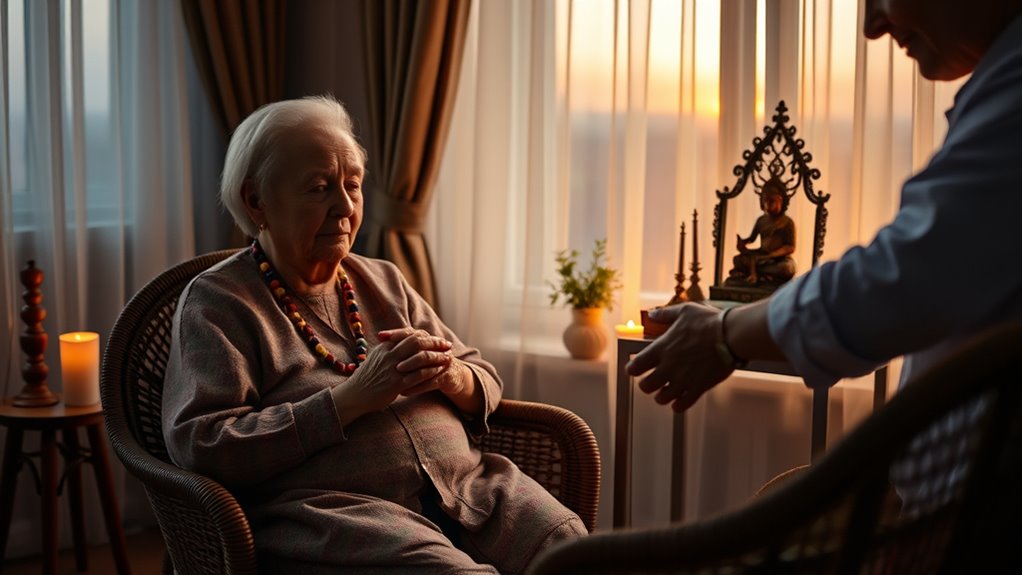When providing end-of-life care, it’s essential to take into account the cultural and spiritual beliefs of the person and their family. These beliefs influence how they approach death, their preferences for rituals, and their need for emotional and spiritual support. Respectful care involves understanding diverse rituals, practices, and preferences, ensuring dignity and comfort. Paying attention to these details helps create a meaningful, personalized experience. Continuing to explore this topic will help you better support those at life’s end.
Key Takeaways
- Respect diverse cultural and spiritual beliefs to guide compassionate, personalized end-of-life care.
- Incorporate rituals and practices that provide comfort, dignity, and spiritual connection for the dying and their families.
- Use open-ended questions and attentive listening to understand individual faith practices and preferences.
- Ensure attention to detail in spiritual support to foster trust, meaning, and respect during final days.
- Adopt a holistic approach that honors mind, body, and spirit, facilitating a meaningful transition aligned with cultural and spiritual values.

End-of-life care is deeply influenced by cultural and spiritual beliefs that shape how individuals and families approach death and dying. Your understanding of these beliefs can profoundly impact the comfort, dignity, and respect given during this sensitive time. Faith practices often serve as guiding principles, helping you and your loved ones find meaning and solace as you navigate the final stages of life. These practices can include prayer, meditation, or specific rituals that reaffirm spiritual commitments and offer a sense of peace. Recognizing and honoring these faith practices isn’t just about respecting tradition; it’s about supporting the emotional and spiritual needs of the dying person and their family.
Ritual significance plays an essential role in end-of-life care because it provides structure, familiarity, and reassurance for those facing death. You might observe specific rites, such as last rites, anointing, or cultural ceremonies, which are believed to facilitate a peaceful transition or ensure spiritual well-being. Participating in or facilitating these rituals shows respect for personal and cultural identity, emphasizing that the person’s beliefs are valued. These rituals often symbolize acceptance, release, or connection with a higher power, helping both the individual and their loved ones find closure. When you incorporate ritual significance into care plans, you help create an environment where spiritual expression is honored, and emotional burdens are eased.
Understanding that faith practices and rituals vary widely across cultures is essential. You need to be sensitive to different ways of expressing spirituality, whether it involves specific foods, clothing, prayers, or ceremonies. For example, some traditions might emphasize communal prayer, while others focus on solitary reflection. You should ask open-ended questions and listen carefully to what the person and family consider meaningful. Doing so allows you to tailor care that respects their spiritual needs and beliefs, fostering an environment of trust and compassion. When spiritual and cultural needs are met, it not only enhances comfort but also affirms the person’s dignity in their final days.
Additionally, recognizing the importance of attention to detail in understanding and respecting individual spiritual practices ensures that care providers can deliver personalized support. Ultimately, integrating faith practices and ritual significance into end-of-life care isn’t just about fulfilling cultural obligations. It’s a fundamental part of holistic care that honors the whole person—mind, body, and spirit. Your role involves being attentive, respectful, and flexible, ensuring that each individual’s spiritual and cultural identity remains central throughout their journey. By doing so, you help create a space where death is not just an ending but also a meaningful transition aligned with personal beliefs and traditions.
Frequently Asked Questions
How Do Cultural Beliefs Influence Decision-Making at End-Of-Life?
Your cultural beliefs shape how you approach end-of-life decisions, often influencing choices about treatment and care preferences. You might face decision conflicts when cultural taboos prevent open discussions or when family expectations clash with medical advice. Understanding these influences helps you navigate sensitive conversations, respecting your values while ensuring informed decisions. Recognizing cultural factors allows you to collaborate with caregivers and loved ones, fostering respectful and meaningful end-of-life planning.
What Are Common Spiritual Practices Across Different Religions?
Spiritual practices across religions are like threads woven into the fabric of faith. You might witness sacred rituals such as anointing, prayer practices, or rites of passage that bring comfort and meaning. These rituals help individuals connect with the divine, find peace, and honor their beliefs. Embracing these practices guarantees that you respect each person’s spiritual journey, providing solace and dignity in their final moments.
How Can Healthcare Providers Effectively Address Language Barriers?
To effectively address language barriers, you should use a medical interpreter to guarantee clear communication, avoiding misunderstandings. Prioritize developing cultural competence so you understand the patient’s background and beliefs, which helps build trust. Always speak slowly, use simple language, and confirm understanding by asking questions. This approach ensures the patient feels heard, respected, and receives appropriate care aligned with their cultural and spiritual needs.
What Role Do Family Dynamics Play in End-Of-Life Planning?
Family dynamics considerably influence end-of-life planning by shaping family communication and decision conflicts. You should encourage open conversations, ensuring everyone’s voice is heard. Recognize that disagreements may arise, so mediate with sensitivity to find common ground. Respect cultural and spiritual beliefs, which often affect decisions. Your role is to facilitate understanding and support, helping families navigate conflicts and make choices that honor the patient’s wishes and values.
How Can Care Teams Respect Non-Traditional Spiritual Rituals?
Respectful communication is your bridge to understanding, ensuring non-traditional spiritual rituals are honored. You can adapt rituals thoughtfully by listening intently and asking questions to grasp their significance. Be open to ritual adaptation, like bending traditions gently to fit the care setting, demonstrating respect and flexibility. This approach helps create a compassionate environment where spiritual needs are honored, much like a gardener tending to diverse blooms with care and patience.
Conclusion
As you navigate end-of-life care, remember that honoring cultural and spiritual beliefs is like tending a delicate garden, each flower representing a unique tradition or belief. By listening with open hearts, you become a gentle guiding breeze, helping loved ones find peace amidst life’s final chapter. Embrace these sacred moments, allowing understanding and compassion to bloom, creating a tapestry of dignity and love that will linger like a soft, enduring sunset in everyone’s memory.









